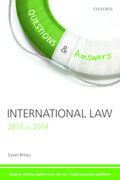By Paul Bramwell
For many students it’s that time of year again when the festive cheer has ended and they are brought back down to earth with a bump by the prospect of mountains of revision to plough through.
To help, we asked some students from the OUP Student Law Panel for their top revision tips that help them survive the exam season, and have a collection of their responses for you below.
- Whatever degree you’re studying, flash cards are definitely the way forward during exam season. Whether you’re writing out complex equations, facts and dates, or useful quotes, flash cards are great. Test yourself, test your housemates, and pin them up everywhere! Charlotte Elves, 1st year, University of Birmingham
- Try to find a willing victim to talk through your revision topics with you. Not only will giving small presentations help you realise whether you have a grip on the information, it will also help you organise your thoughts on the spot which will assist in planning any essays. Adam Fellows, 1st year, Northumbria University
- Revision requires self-restraint. From indulgence, from slothfulness, from procrastination. But such an ascetic life can quickly become draining and, in the end, self-defeating. So my tip is to take unscheduled liberties. A sensible plan with healthy study breaks is tedious. A ridiculously intensive plan with minor rebellions is refreshing. James Manwaring, 3rd year, University of Warwick
- Observe, imagine, and relate. For example, a ‘Private’ sign outside a farm reminds me of trespassing and triggers my imagination of different scenarios. I then think about what the relevant laws and the cases are. This not only consolidates your understanding, but also raises some unrecognised confusions. Tina Mok, 1st year, University of Nottingham
- I would always recommend using a wide range of textbooks in revision. In particular, I use small revision guides and also more in-depth textbooks to ensure I cover all the points needed for my exam. I then use these bits of information to create a spider diagram, which contains all the cases, theories, and reports from a variety of different sources. Emma Bray, 3rd year, University of York
- I first make comprehensive revision notes and then start by repeatedly copying them out until I can remember the information. Each time, I cut the total words I write by half until I can summarise an A4 page in a handful of words. Then, a parent or friend tests me vocally. James Robins-Johnson, 1st year, University of York
- Try to remember any relevant cases by associating each one of them with an image or memory so that they are easier to recall during an exam (aka neural networking). Waqar Aziz, 1st year, University of Salford
- Make the best use of seminar preparation and attendance, as they condense all the information given in lectures and the exams are usually based around topics which are discussed in seminars. Leanne Newton, 2nd year, Swansea University
- The revision method that worked well for me was to create mind-maps on the separate topics of the subject I’m doing. I made them colourful and pinned them to my wall so that I saw them. I also think that a really good way of remembering cases is to make an A3 page and get pictures which relate to each case. That way I remembered the case by remembering the picture that went with it. Laura Ashmore, 1st year, University of York
- For me the most important study tip is to make a plan of what and when you are going to study. This ensures you can maintain an organised routine and allows for you to keep an overview on your progress at all times. Tobias Hoecker, 1st year, University of Warwick
For more help on getting through your law revision, look no further than OUP’s two revision guide series, Concentrate and Q&A, with a series of new editions being released this spring.
Paul Bramwell is a Marketing Assistant for higher education law books at Oxford University Press. The OUP Student Law Panel is an invaluable resource for the UK Higher Education team. The feedback they provide in response to surveys on a variety of topics including study methods and features of OUP products is very influential in directing the future of OUP’s publishing and marketing projects.
If you’re feeling overwhelmed by a sea of revision, let OUP’s Questions and Answers series keep you afloat! Written by experienced examiners, the Q&As offer expert advice on what to expect from your exam, how best to prepare, and guidance on what examiners are really looking for. Revision isn’t always plain sailing, but the Q&As will allow you to approach your exams with confidence.
Subscribe to the OUPblog via email or RSS.
Subscribe to only law and politics articles on the OUPblog via email or RSS.
Image Credit: A Student of the University of British Columbia studying for final exams, public domain via Wikimedia Commons





Recent Comments
There are currently no comments.